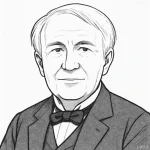“Blessed are the forgetful: for they get the better even of their blunders.”

- October 15, 1844 – August 25, 1900
- Born in Germany
- Philosopher, poet, and classical philologist
table of contents
Quote
“Blessed are the forgetful: for they get the better even of their blunders.”
Explanation
In this quote, Friedrich Nietzsche highlights the virtue of forgetfulness, suggesting that those who are able to forget or let go of their mistakes, regrets, or blunders are better off than those who hold onto them. Forgetfulness, in Nietzsche’s view, is not a weakness but a strength, as it allows individuals to move forward in life without being hindered by past errors. By forgetting, a person is able to free themselves from the emotional weight of their mistakes and continue living with a sense of renewed possibility. Nietzsche points out that memory can often become a burden, trapping individuals in cycles of self-blame or regret, while forgetfulness offers a kind of liberation, allowing them to learn from their mistakes without being defined by them.
Historically, Nietzsche often critiqued the way people and societies become trapped in their past—whether through guilt, tradition, or resentment. He argued that true personal growth and freedom come from the ability to overcome the past and embrace the present and future. Forgetfulness, in this sense, becomes a way to practice self-overcoming—shedding the weight of old errors in order to move forward with greater strength and clarity.
In modern contexts, this quote can be applied to how we deal with mistakes and failure in our everyday lives. Nietzsche’s perspective encourages us to forgive ourselves, let go of the past, and focus on growth and learning from our experiences. Whether in personal relationships, careers, or self-development, being able to forget and move past blunders can be a powerful tool for emotional resilience and mental well-being. Nietzsche’s words remind us that holding onto mistakes only serves to weigh us down, while forgetting and moving forward can be a path toward greater freedom and empowerment.
Would you like to share your impressions or related stories about this quote in the comments section?




